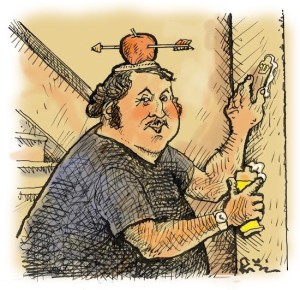 Haim Watzman
Haim Watzman
So intensely was I listening to my iPod that I bumped straight into Haim Abutbul as I galloped into the stairwell leading up to my apartment. Haim is my downstairs neighbor, and other than sharing a name, we don’t have much in common. He’s Moroccan, retired, round, short, and has a moustache. I’m the opposite.
After I apologized and he mumbled an acceptance, he strode right past me, smeared silicone on the door jamb, and affixed a clear plastic mezuzah. Stepping back to admire his handiwork, he bumped into me again. This time he apologized and I mumbled.
“I bought a new one,” he explained. “New housing, new and expert parchment. The works.”
I nodded, in rush to get upstairs to a long-delayed lunch. “Tizkeh lemitzvot,” may you perform many other good deeds, I said. I put a foot on the bottom step but Haim would not let me go.
“Haim, you must have noticed that a lot of people in our entrance have been getting sick lately,” Haim said ominously.
“I hadn’t,” I apologized. “I feel fine myself.”
high holidays
Putting God in the World: Psalm 27 From Faith to Doubt to Action
There’s a canard that religious people hear again and again from their non-religious acquaintances: “I’m jealous. It must be such a comfort to be able to believe in God.” They haven’t read Psalm 27, which observant Jews recite twice daily from the beginning of the month of Elul (which began earlier this week) throughout the holiday season that concludes eight weeks later.
The psalm (Read the Hebrew text, the 1917 Jewish Publication Society translation, and hear the Psalm read in the original Hebrew here) belies such a naïve view of the relationship between human beings and God.
Famously, this poem seems to run backwards, if your standard is the assumption that people pray so that their prayers will be answered. It begins with a declaration of confidence in God’s protection, goes on to pleading, then to expressions of loneliness and doubt, and ends with a determined affirmation of God despite the uncertainty the poet sees in the world around him. The disparity of mood is so great that some scholars have suggested that the psalm is actually an amalgamation of two entirely separate works.





